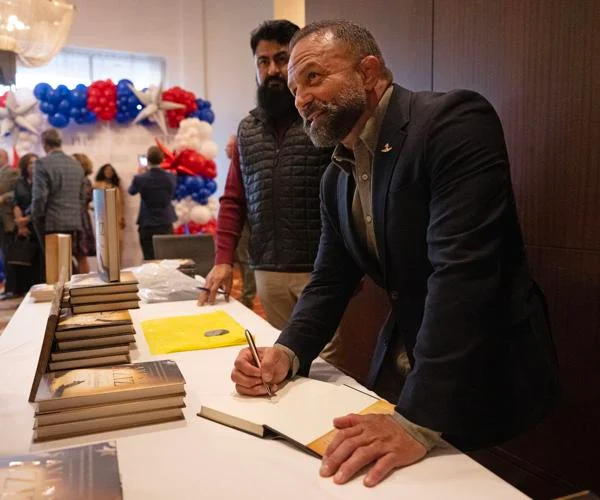
These prosecutors assisted the US in Afghanistan. Now, Louisiana DAs fight to help them escape.
During the war in Afghanistan, thousands of Afghan prosecutors helped the United States convict militants responsible for war crimes, corruption and crimes against women.
After the U.S. pulled its remaining troops out of Kabul in August 2021, many of those prosecutors were unable to evacuate the country. An event Thursday night at the Renaissance Hotel in Baton Rouge raised money to right a wrong and aid in their relocation.
“No man left behind” was the theme of the fundraiser, emceed by East Baton Rouge Parish District Attorney Hillar Moore and sponsored by the organization Prosecutors for Prosecutors.
More than 3,700 former justice sector workers remain behind in Afghanistan and neighboring countries, Moore said, and 57 have been killed since 2021.
“We promised those that supported our rule of law — for example, prosecutors — that we would not leave them behind. We did not fulfill our promise,” Moore said in his opening remarks.
It costs Prosecutors for Prosecutors around $10,000 per family to bring them to the U.S. Due to a lack of funds, the group so far has been able to assist in the rescues of only 19 families.
The ballroom Thursday night was full of DAs from across Louisiana, representatives from the Louisiana Office for Refugees, former and current U.S. generals and veterans, and others, all raising money to assist in these prosecutors’ evacuations.
The event included a silent auction of paintings, flags, handmade gifts, dinners, vacations and more. Moore estimated the night raised more than $300,000.
Chad Robichaux, a Marine Corps special forces veteran and author of the narrative “Saving Aziz,” spoke during the event. His book catalogs the efforts he took to evacuate his interpreter, Azizullah Aziz, from Afghanistan following the U.S. withdrawal. Aziz was also in attendance Thursday to sign copies of the book.
Other former Afghan nationals were in attendance as well, receiving applause from the audience.
Before the fall of Afghanistan’s former republican government, the U.S.-allied state employed thousands of prosecutors who worked to convict criminals in the same way prosecutors do in America, only with the added difficulties of the ongoing war.
Naija Mahmodi specialized in prosecuting crimes against women under the former republican government.
Born during the civil war, Mahmodi recounted how she and her older sister were kept from attending school by the Taliban’s policies prior to the invasion of Afghanistan.
This contributed to the uncertainty of her childhood goal: becoming a licensed lawyer or judge in her home nation. Eventually, her family secured a full university scholarship to the American University of Afghanistan in Kabul where Mahmodi earned her law degree.
“I eventually became a prosecutor, and we, the department for the Elimination of Violence Against Women, which was established in 2016, were prosecuting 3,000 to 4,000 cases,” Mahmodi said.
She took a moment to thank the former Attorney General of Afghanistan’s republican government, Mohammad Farid Hamidi, who helped establish the department and was in the audience Thursday.
“I know how the prosecutor’s life can be hard,” she said.
When the U.S. withdrawal from Afghanistan began, Mahmodi was cast into the chaos of reaching the Kabul airport for evacuation.
Her evacuation was hampered by the fact she did not have a passport for her infant daughter. She said many of her friends and colleagues encouraged her to evacuate on her own and leave her family in Afghanistan. That wasn’t an option for Mahmodi.
She had even heard that thousands of the prisoners that her department had worked to put away were being released from the Kabul prison.
“I was not sure that if I could go back home, because prosecutors were one of the most targeted people in Afghanistan. We have lost hundreds of prosecutors in Afghanistan,” she said.
Mahmodi was on maternity leave at the time, living with her husband and children, including her 20-day-old daughter. They were forced to leave with little to no belongings, getting a call from U.S. special forces only minutes before the family was supposed to leave.
In the night, she and her family were carted through street checkpoints in Kabul before reaching the airport. There, they were allowed through a fence while others crowded the gate.
“I cannot forget their faces and the fear that they were facing on that moment. And they were all begging me to take them with me to the airport, but I was not allowed,” she said.
After 12 hours of waiting in the sun, without formula for her infant or shoes for her son, Mahmodi and her family were chartered on a flight to Doha, Qatar, then to the U.S. In the weeks that followed, the family eventually settled in Chicago where Najia was offered a job at Northwestern University.
“Right now I’m preparing for the bar exam to continue my career again in the United States,” she said.
For many who were in Mahmodi’s shoes, the opportunity for escape has not yet come. The Renaissance ballroom was lined with placards showing anonymous testimonials from prosecutors still in hiding, asking for help.
